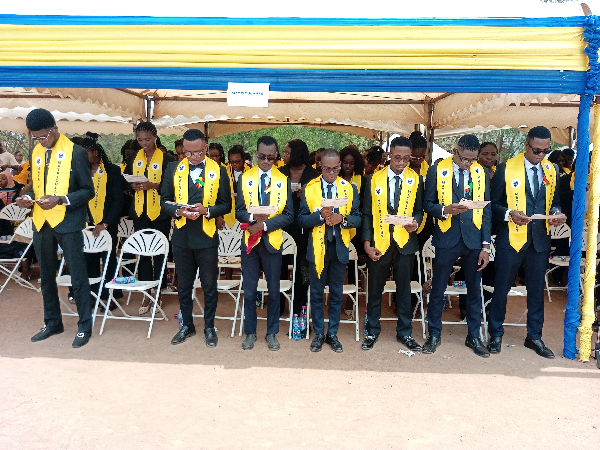The Chief Executive Officer (CEO) of the telecommunications giant, Telecel, has highlighted the crucial role technology plays as a driver for development.
She emphasized its role in modernizing healthcare, communication, transportation, education, creating jobs, and fostering innovation, particularly through digital transformation and other sectors.
Ing. Patricia Obo-Nai was speaking as the guest speaker at the 14th matriculation and 16th congregation (56th graduation) of the Ghana Christian University College, held at Amrahia near Accra on Saturday, March 29, 2025.
The event was themed, ‘Inculcating Industrial Skills in Academia: Key to Nation Building.’
The CEO stressed the importance of technology in various sectors of development, stating that it is not only refining productivity but also improving timely access to markets and value.
“The rapid pace of technological innovation is driving advancements in healthcare, communication, transportation, education, and other sectors. These innovative solutions are improving efficiency, speeding up time-to-market, and delivering value to both consumers and businesses,” she said.
She went on to outline various innovations, such as medical devices, communication technologies, renewable energy solutions, and educational tools, all of which have transformed the way people live, work, and interact.
“Countries and organizations that prioritize technological innovation gain a competitive advantage, attract investment, and stimulate economic development. Innovations in areas such as artificial intelligence, biotechnology, nanotechnology, and space exploration have revolutionized industries,” she added.
According to the guest speaker, other innovations like social media, mobile applications, and online platforms have changed the way people communicate, collaborate, and engage with the world.
Touching on the key element of quality human resources in technological advancement, the CEO identified human resources as the most critical factor. She emphasized the need for tertiary institutions to produce quality students to ensure a strong future workforce.
“Inculcating industrial skills into academia as the key to nation-building is a theme that’s highly relevant for our times,” she stated.
Ing. Patricia Obo-Nai also highlighted the need for academia to remain connected with industry in order to prepare a workforce that is fit for the future.
She called for educators and policymakers to partner with industry to undertake projects that address industry needs, create platforms for knowledge exchange, and encourage continuous learning and exposure to industry to help academia adapt faster to the changing demands of the market.
She urged the matriculating students to take their industrial attachments seriously so they can apply their academic learning in the real world, sharpen their skills, and understand how their contributions will impact businesses, lives, and communities.
She also encouraged the graduating students to leverage the skills they had acquired to serve a higher purpose in nation-building. Graduation Ceremony
A total of 280 freshmen and women were matriculated to pursue various programs in health sciences, business studies, and technology. Additionally, 183 students graduated from the institution, with 141 from the Faculty of Health Sciences and 42 from the Faculty of Business Studies and Technology.
The event also saw the third graduation of 72 students from the Certificate in Counselling course.
Speaking on the theme for the occasion, the President of the Ghana Christian University College, Rev. Dr. James Yamoah, explained that the theme underscores the importance the institution attaches to the acquisition of appropriate industrial skills.
He reiterated GHANACU’s commitment to fostering critical thinking as an essential tool, stressing that the institution is still seeking assistance to enhance critical thinking so its graduates can compete favorably with their counterparts worldwide.
Dr. Yamoah also mentioned significant progress made in the institution’s academic performance. The Faculty of Health Sciences successfully underwent the reaccreditation process for BSc. Health Information Management and BSc. Public Health.
Similarly, the Faculty of Business Studies and Technology has successfully gone through its reaccreditation for BSc. Human Resource Management, BSc. Marketing, and BSc. Accounting programs.
He welcomed the freshmen and women as they embarked on the next chapter of their academic journey. The president also congratulated the graduates and encouraged them to make valuable contributions to their country and the world.
Two of the longest-serving members of the institution’s council, Prof. Adelaide Naa Amerley Karstner and Mr. Edward Katey Amanor, were honored for their service.
On his part, the Chairman of the university’s governing council, Prof. Samuel K. Offei, outlined the further needs of the university, including expanding its infrastructure to accommodate more classrooms, administrative and faculty offices, a comprehensive library, a skills laboratory, and student hostels.
The matriculating students signed their matriculation cards and made their matriculation declarations, while the graduates took the alumni oath, which was conferred upon them. Outstanding students in various programs were also honored during the ceremony.


